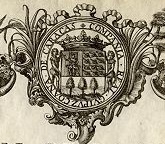Guipuzcoana Company
 |
|
| Public company | |
| Industry | Trade |
| Fate | Dissolved |
| Successor | Royal Company of the Philippines |
| Founded | 1728 |
| Defunct | 1785 |
| Headquarters | San Sebastián, Madrid, (Gipuzkoa) Spain |
The Royal Guipuzcoan Company of Caracas (modern spelling variant Gipuzkoan, known also as the Guipuzcoana Company, Spanish: Real Compañia Guipuzcoana de Caracas; Basque: Caracasko Gipuzkoar Errege Konpainia) was a Spanish Basque trading company in the 18th century, operating from 1728 to 1785, which had a monopoly on Venezuelan trade. It was renamed in 1785 the Royal Philippine Company.
The Company was founded by a group of wealthy Basques from the province of Gipuzkoa in 1728. The specific aim of the Basque Company, acting almost autonomously with tasks of military nature at their own command and expense, was to break the de facto Dutch monopoly on the cocoa trade in the Captaincy General of Venezuela.
It was initially based in San Sebastián and received its royal decree on September 25, 1728, by Philip V of Spain. Its creation was part of the larger Bourbon Reforms to control unlicensed trading, especially in tobacco, which existed along the Orinoco River and mostly benefited the foreign, Dutch, English, and French traders, who were preferred by the landholders of Canary Islander descent as trade partners. The Venezuelan possessions and their managerial wealthy Creole class thus operated detached from the metropolis. The Venezuelan colonial system turned into an embarrassment and hardly productive for the Spanish-Castilian Crown in terms of revenue. Between 1700 and 1728 only five vessels set sail from Spain to Venezuela.
The establishment of the Company resulted from negotiations engaged with the Basque governments in the aftermath of the bloody military campaign ordered by Philip V of Spain over the western Basque districts. The government of Gipuzkoa in particular came up with a proposal for the re-establishment of commerce with Venezuela that would suit the Basque interests and those of the Spanish king alike. The plan was approved, with the Basques getting total exclusivity on that commerce.
...
Wikipedia
